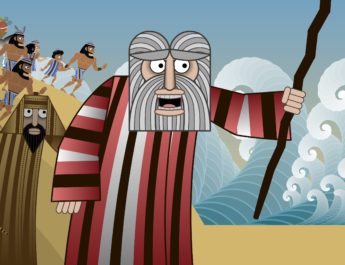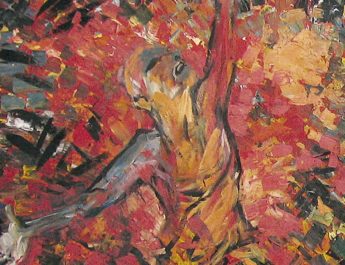Psalm 50:1-8, 22-23
Ordinary C37
A PsalmA of Asaph.B
1 The mighty one,C GodD the Lord,E
A “Psalm” = mizmor. From zamar (making music; used specially of music to worship God; music with singing, singing praise, singing psalms); may be from zamar (to trim or prune). This is a melody or a psalm.
B “Asaph” = Asaph. From asaph (to gather, assemble, bring, take away, destroy, or remove). This is Asaph, meaning “gatherer” or “collector.” It is a personal name.
C “mighty one” = el. This can refer to God or a god. It can also refer to power, an idol, or one that is powerful.
D “God” = Elohim. Related to “mighty one” in v1. From eloah (God, a god); from el (see note C above). This is most commonly used as a name for God. Technically, it’s in the plural, i.e. gods. It can also mean great, mighty, judge, or ruler.
E “Lord” = YHVH. From havah (to be, become) or hayah (to come to pass, become, be). This is the name of the God of Israel, the self-existent and eternal one, the tetragrammaton. This pronunciation has been lost to time so “Lord” is generally used in its place.
speaksF and summonsG the earthH
from the risingI of the sunJ to its setting.K
F “speaks” = dabar. This is generally to speak, answer, declare, or command. It might mean to arrange and so to speak in a figurative sense as arranging words.
G “summons” = qara. This is to call or call out – to call someone by name. Also used more broadly for calling forth.
H “earth” = erets. Root may mean to be firm. This is earth, ground, field land, or country.
I “rising” = mizrach. From zarach (to rise, shine, or dawn; can also describe symptoms of leprosy). This is the east as the place where the sun rises. It can also refer to the sunrise itself.
J “sun” = shemesh. This is sun or toward the east. Its root may mean being brilliant. Figuratively, this could be a ray or an arch.
K “setting” = mabo. From bo (to come in, go in, enter). This is entrance, coming in – the process of entering or the place of entrance. It can also mean the setting of the sun i.e. the west.
2 Out of Zion,L the perfectionM of beauty,N
God shines forth.O
3 Our God comesP and does not keep silent;Q
L “Zion” = Tsiyyon. Related to tsyiyyun (signpost, monument); from tsavah (to charge someone, to command, order); from the same as tsiyyah (dryness drought); from a root meaning parched as desert, dry land. Zion can refer to a mountain in Jerusalem as well as another name for Jerusalem itself or the people.
M “perfection” = miklal. 1x in OT. From kalal (to complete, perfect). This is perfection or completeness.
N “beauty” = yophi. 19x in OT. From yaphah (to be beautiful, decorate; root means being bright, which implies being beautiful). This is beauty.
O “shines forth” = yapha. 8x in OT. This is to shine out beams, look favorably.
P “comes” = bo. Related to “setting” in v1. See note K above.
Q “keep silent” = charash. This is to scratch, which implies etching or plowing. It can mean to manufacture regardless of materials used. Figuratively, it can be to devise or conceal. It can also have a sense of secrecy. Hence, being silent or left alone. It can also be speechless.
beforeR him is a devouringS fireT
and a mightyU tempestV all aroundW him.
R “before” = paneh. From panah (to turn, face, appear). This is face in a literal or figurative sense. It could be face, presence, anger, respect. It can also be used of God to indicate divine favor or presence.
S “devouring” = akal. This is to eat, devour, burn up, or otherwise consume. It can be eating in a literal or figurative sense.
T “fire” = esh. This is fire, burning, flaming, hot. It is fire in a literal or figurative sense.
U “mighty” = meod. Perhaps from the same as uwd (firebrand, a poker). This is very, greatly, exceedingly. It can also mean vehemence, force, abundance.
V “tempest” = sa’ar. 8x in OT. This is to storm, whirl away, shiver, be afraid.
W “all around” = sabib. From sabab (turning around, going around; to surround, cast, walk, fetch; to revolve or border in a literal or figurative sense). This is a circuit or a circle. It could refer to an environment, one’s neighbors, or a circular path round about.
4 He callsX to the heavensY aboveZ
and to the earth, that he may judgeAA his people:BB
X “calls” = qara. Same as “summons” in v1. See note G above.
Y “heavens” = shamayim. Root may mean being lofty. This is sky, the air, or heaven. It is in a dual noun form so this might refer to the part of the sky where the clouds move on the one hand and the part beyond that where the sun, moon, and stars are on the other hand.
Z “above” = al. 4x in OT. From alah (to go up, ascend, be high, be a priority; to arise in a literal or figurative sense). This is upward, the top, aloft, highest, to God.
AA “judge” = din. This is to judge, defend, dispute, govern, quarrel, plead.
BB “people” = am. From amam (to darken, hide, associate; creating shadows by huddling together). This is people or nation. It can be used specifically for a tribe, collectively of troops or armies, or figuratively to refer to a flock of animals.
5 “GatherCC to me my faithful ones,DD
who madeEE a covenantFF with me by sacrifice!”GG
CC “gather” = asaph. Related to “Asaph” in superscript. See note B above.
DD “faithful ones” = chasid. From chasad (being good, kind, merciful; may mean bowing one’s neck as is done in the presence of an equal for courtesy’s sake; so, if one in a superior position is treating you like an equal, that is what is captured here). This is faithful, kind, pious, merciful, or gracious. It can also refer to godly or pious people. This is where Chasidic Jews take their name from.
EE “made” = karat. This is to cut down, cut off, or make a covenant (idiom for making a covenant is “to cut a covenant”). It can also mean to destroy, fail, or consume.
FF “covenant” = berit. Perhaps from barah (to eat, choose, make clear); perhaps from bar (grain, wheat); from bara (to select, purify, cleanse, test, brighten, polish). This is a compact, covenant, alliance, treaty, or league.
GG “sacrifice” = zebach. From zabach (to kill, slay, offer; slaughtering an animal to offer as a sacrifice). This is a slaughter – literally of an animal. So, it implies the act or the animals used in sacrifice. Further, it can mean offering.
6 The heavens declareHH his righteousness,II
for God himself is judge.JJ SelahKK
HH “declare” = nagad. This is to declare, make conspicuous, stand in front, manifest, predict, explain.
II “righteousness” = tsedeq. This is rightness, righteousness, vindication. It is everything that is just or ethical. That which is right in a natural, moral, or legal sense. It also includes just weights (i.e. true weights). Figuratively, this is justice, righteousness, equity – even prosperity.
JJ “judge” = shaphat. This is to judge, defend, pronounce judgment, condemn, or govern. It can refer to God judging or to human judges. This is pronouncing a verdict in favor or against so it implies consequences or punishment. It can also mean to litigate or govern as one with authority.
KK “Selah” = selah. From salal (to lift up, build, pile, extol, exalt; can also be used for opposing as a dam holds back water). This is to lift up or exalt. Also, “selah” in the psalms where its precise meaning is uncertain. It could be a pause in the music, a moment of silence. It could signal a change in the service or mean something akin to amen.
7 “Hear,LL O my people, and I will speak,
O Israel,MM I will testifyNN against you.
I am God, your God.
LL “hear” = shama. This is to hear, call, consent, or consider. It implies listening intelligently, giving attention, and, because of these two factors, obedience and action are often implied.
MM “Israel” = Yisrael. Related to “mighty one” and “God” in v1. From sarah (to persist, exert oneself, contend, persevere, wrestle, prevail) + el (see note C above). This is Israel, meaning God strives or one who strives with God; new name for Jacob and for his offspring. This refers to the people and to the land.
NN “testify” = uwd. This is to repeat, return, do again. This implies testifying something since that is a repetition. It can also mean to charge, admonish, protest, relieve, restore, or lift up.
8 Not for your sacrifices do I rebukeOO you;
your burnt offeringsPP are continuallyQQ beforeRR me.
OO “rebuke” = yakach. This is to decide, be right, argue, or convince. It can also be to decide, convict, reason together, or reprove.
PP “burnt offerings” = olah. Related to “above” in v4. From alah (see note Z above). This is a step, stairs, or some kind of ascent. It is also used for whole burnt offerings, being the offering in which the whole things is burned and rises as smoke. Burnt offerings were the least common of the offerings: most were eaten, shared with the priest and the one bringing the offering.
QQ “continually” = tamid. May come from a word that means to stretch. This word means an indefinite period of time. So, it could be regular or daily. It could also be constantly, continually, always, or perpetually.
RR “before” = neged. Related to “declare” in v6. From nagad (see note HH above). This is in front of, opposite to. It can refer to a counterpart or partner, one corresponding to or in the sight of.
22 MarkSS, TT this, then, you who forgetUU God,VV
orWW I will tear you apart,XX and there will be no one to deliver.YY
SS “mark” = bin. This is to discern, consider, attend to. It refers to distinguishing things in one’s mind or, more generally, to understand.
TT {untranslated} = na. This particle is used for requests or for urging. It can be we pray, now, I ask you, oh. This is the same “na” in “hosanna.”
UU “forget” = shakach. This is to forget because of not remembering something or not paying attention to it. It can also mean to mislay.
VV “God” = Eloah. Related to “mighty one” and “God” in v1 & “Israel” in v7. See note D above.
WW “or” = pen. Related to “before” in v3. Perhaps from panah (see note R above). This is lest, if, or.
XX “tear…apart” = taraph. This is to tear or pluck off into pieces, to rend or catch. It can also mean supply with food.
YY “deliver” = natsal. This is to snatch someone or something away in a good sense – as rescue, defend, or deliver – or in a bad sense – as strip or plunder.
23 Those who bringZZ thanksgiving as their sacrificeAAA honorBBB me;
ZZ “bring” = zabach. Related to “sacrifice” in v5. See note GG above.
AAA “thanksgiving as…sacrifice” = todah. From yadah (to throw one’s hands into the air in a gesture of praise, to give thanks, or make a confession); from yad (hand, ability, power; hand in a literal sense; what one can do or the means by which one does it). This is properly extending one’s hand, which implies affirmation and adoration. It can be a song of thanksgiving, a choir of thanksgiving, confession, or praise. It can also be a thank offering.
BBB “honor” = kabad. To be heavy, weighty, or severe. It can also be positive abounding in, rich, or honorable. The Hebrew word for “glory,” kabod, is taken from this root.
to those who goCCC the right way,DDD
I will showEEE the salvationFFF of God.”
CCC “go” = sim. This is to put or place in a literal or figurative sense. It can be appoint, care, change, make, and may other things.
DDD “way” = derek. From darak (to tread, march, to walk. Can also mean affixing a string to a box since one needs to step on it to bend it in the process; so also an archer). This is a road as a thing that is walked on. Can be used figuratively for the path that one’s life takes or how one chooses to live one’s life.
EEE “show” = raah. This is to see in a literal or figurative sense so stare, advise, think, view.
FFF “salvation” = yesha. From yasha (to deliver, defend, help, preserve, rescue, be safe. Properly, to be open, wide or free, which implies being safe. Used causatively, it means to free). This is salvation, deliverance, rescue, safety, welfare, liberty.
Image credit: “Palmyra Sandstorm” by mgjb, 2004.




